“TESLA’S RAY.”
“TESLA’S RAY.”
Time, July 23rd, 1934.
“He has produced nothing tangible for a long time, but he still remains one of the foremost living inventors of electrical apparatus. His day comes once a year. On his birthday Manhattan newshawks seek him out in some hotel, listen closely to his words. Wearing an outmoded brown suit, he received the Press one day last week in a Hotel New Yorker reception room. That day Nikola Tesla was 78.
"The first thing Nikola Tesla invented was a hook for catching frogs. That was not long after he learned to talk, in the Croatian hamlet of Smiljan where he was born. He studied physics and mathematics at two universities, got into telegraph engineering, went to Budapest, to Paris, to the U. S. in 1884 to work for Thomas Edison. Soon he had a research laboratory of his own. Four years later he patented the induction motor, first effective utilization of alternating current. He discovered the rotary magnetic field principle used today in the hydroelectric plants at Niagara Falls. He invented dynamos, transformers, induction coils, condensers, arc and incandescent lamps. He was acclaimed a great genius.
"All that was long ago and Tesla has lingered on into a twilight of semi-obscurity. His hotel room is now his only laboratory, his brain his only tool. When callers importune him he takes a bath or goes to bed. When he talks about his work his deep-set blue eyes burn with an icy fire. He walks prodigious distances through the city streets. His most valued friends are the New York Public Library’s somnolent pigeons. A life-long bachelor, Dr. Tesla is tall, spare, erect, parchment-skinned, beak-nosed. The mustache he once wore is gone.
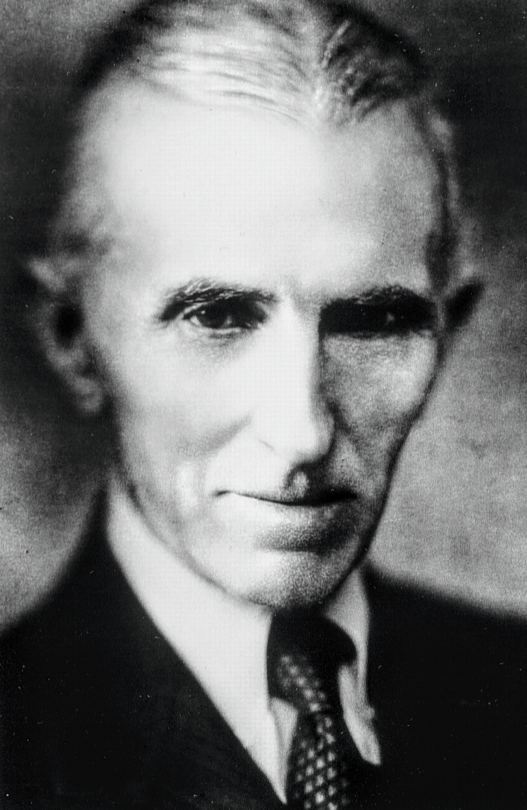
"Even at the peak of his renown he had great visions. In 1900 he was ready to cure tuberculosis with oscillating electricity. In 1909 he promised motors capable of driving ocean liners at 50 knots. In 1911 it was storm-proof dirigibles without propellers. In the last decade his annual utterances have been mostly rehashes of previous interviews, with something new every three or four years. In 1924 he was planning to transmit power by radio. In 1927 he was scheming to harness sea power. In 1931 he would make all fuels superfluous by tapping cosmic energy. Last week Dr. Tesla announced a combination of four inventions which would make war unthinkable.
"Nucleus of the idea is a death ray — a concentrated beam of sub-microscopic particles flying at velocities approaching that of light. The beam, according to Tesla, would drop an army in its tracks, bring down squadrons of airplanes 250 miles away. Inventor Tesla would discharge the ray by means of: 1) a device to nullify the impeding effect of the atmosphere on the particles; 2) a method for setting up a high potential; 3) a process for amplifying that potential to 50,000,000 volts; 4) creation of “a tremendous electrical repelling force.” Two of these are complete in Dr. Tesla’s mind. The other two await minor details.
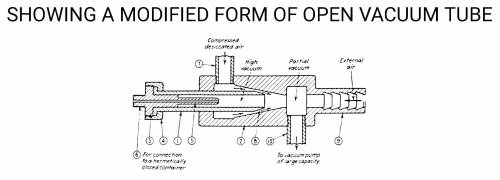
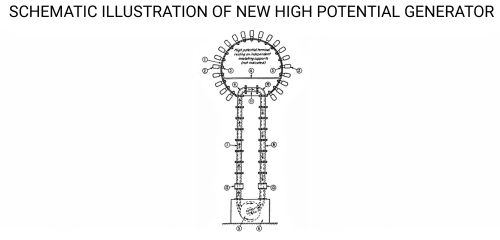
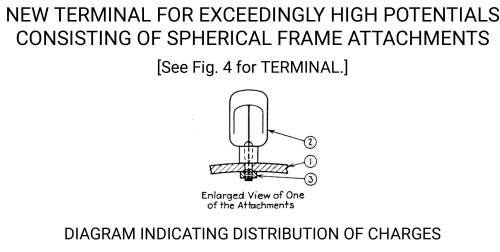
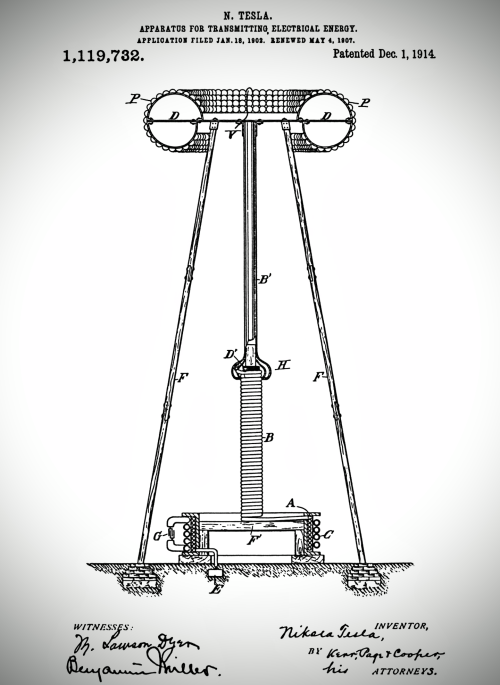
"Dr. Tesla pointed out that the weapon is purely one of defense, since his beam must be generated in great immovable power plants. With generators set up on all the world’s national boundaries, no country would ever again be able to attack another. Further details, said Dr. Tesla, would be unfolded before the Geneva Disarmament Conference.
"The death ray, always exciting to laymen, is an old familiar to scientists. After the interplanetary “space ship,” it is probably the most popular gadget in pseudoscientific fiction. Even in Herbert George Wells’s shrewdly written War of the Worlds (1898), the first act of arriving Martians is to spray spectators with a death beam. In real life death rays have been announced time & again, but never convincingly demonstrated. When one Harry Grinnell-Matthews loudly announced a death ray some years ago in England, Physicist Robert Williams Wood of Johns Hopkins said he would stand 65 ft. from the apparatus and invite Mr. Grinnell-Matthews to turn on his radiations full blast. Last month in Omaha the Inventors’ Congress was informed by its President Albert G. Burns that he had witnessed a death ray demonstration staged by a Clevelander named Antonio Longoria. Rabbits, dogs and cats, said President Burns, were killed instantly, their blood turned to water. But Inventor Longoria said he would withhold his secret until invasion threatened the U. S.
"Excellent is Dr. Tesla’s health, but he looks now & then beyond the grave. When he is reminded that in some quarters his pronouncements are written off as senile hallucinations. he replies with simple dignity: “The opinion of the world does not affect me. I have placed as the real values in my life what follows when I am dead.”

More Posts from The-poet-soul and Others
honestly do u ever get to a point with a friend where u just realize “holy shit I don’t actually like you, like, at all”







The best thing about the bedroom was the bed. I liked to stay in bed for hours, even during the day with covers pulled up to my chin. It was good in there, nothing ever occurred in there, no people, nothing.
Charles Bukowski, Ham on rye (via homoimbecillium)

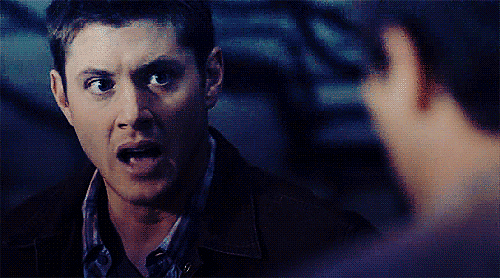
LIKE SERIOUSLY.

The path to paradise begins in hell.
Dante Alighieri (via quotemadness)
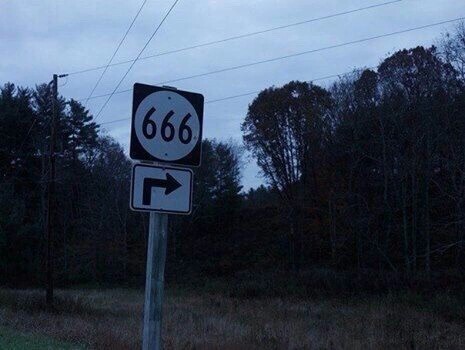
♡Innocence lost♡

My Translation of Nikola Tesla’s Poem
By J. J. Jones

“Fragments of Olympian Gossip.” By Nikola Tesla
While listening on my cosmic phone (Nikola Tesla listening to his receiving device in his laboratory)
I caught words from the Olympus blown. (He’s eavesdropping on heaven, or Olympus, where the Gods of science live)
A newcomer was shown around; (A well-known scientist must have passed away on earth and is being shown around heaven)
That much I could guess, aided by sound. (From what Tesla could hear through his device)
“There’s Archimedes with his lever.” (The mysterious chaperone points out Archimedes)
“Still busy on problems as ever.” (Who even in the afterlife is still working on his mathematical problems)
“Says: matter and force are transmutable.” (Archimedes thought matter and force can be changed from one nature to another)
“And wrong the laws you thought immutable.” (The newcomer must have thought force and matter were unalterable)
“Below, on Earth, they work at full blast.” (Earth is busy as always)
“And news are coming in thick and fast.” (News from earth to heaven)
“The latest tells of a cosmic gun.” (Around the time this poem was conducted Guglielmo Marconi was frightening the public with a “ray-gun” for war)
“To be pelted is very poor fun.” (violence is immoral)
“We are wary with so much at stake,” (Heaven is wary of mankind)
“Those beggars are a pest—no mistake.” (The attention seekers of science are becoming nuisances)
“Too bad, Sir Isaac, they dimmed your renown.” (The newcomer finally speaks to his chaperone, who we now learn is Isaac Newton)
“And turned your great science upside down.” (Modern science is ruining Newtonian physics)
“Now a long haired crank, Einstein by name,” (Albert Einstein)
“Puts on your high teaching all the blame.” (Einstein’s theories oppose Newtonian physics)
“Says: matter and force are transmutable.” (Einstein, like Archimedes, thought force and matter is interchangeable. Issac Newton believed matter and force are unalterable)
“And wrong the laws you thought immutable.” (Einstein’s physics suggest that Newtonian physics are false)
“I am much too ignorant, my son,” (Issac Newton speaking again)
“For grasping schemes so finely spun.” (Referring to Einstein’s metaphysics)
“My followers are of stronger mind” (Those scientists who still follow Newtonian physics and cause and effect)
“And I am content to stay behind,” (He’ll stick with his own theories and let science go in err)
“Perhaps I failed, but I did my best,”
“These masters of mine may do the rest.” (Nikola Tesla)
“Come, Kelvin, I have finished my cup.” (We now learn that the newcomer is Lord Kelvin. He was a great scientist and a good friend of Tesla’s who had passed away in 1907.)
“When is your friend Tesla coming up?” (Newton asking Kelvin when Tesla will join them in Olympus)
“Oh, quoth Kelvin, he is always late, (Tesla was never on time)
"It would be useless to remonstrate.” (And it’s pointless to try and change it)
Then silence—shuffle of soft slippered feet—(End of conversation between Kelvin and Newton)
I knock and—the bedlam of the street. (Tesla departs from his dream and his laboratory into the busy streets of New York City)
(Poem written by Nikola Tesla in the 1920s to his friend George Sylvester Viereck.)

-
 iamnofilter liked this · 3 years ago
iamnofilter liked this · 3 years ago -
 lilo-balzac liked this · 5 years ago
lilo-balzac liked this · 5 years ago -
 saturnocturnal liked this · 5 years ago
saturnocturnal liked this · 5 years ago -
 driving-in-cars-with-boys liked this · 5 years ago
driving-in-cars-with-boys liked this · 5 years ago -
 diannajones liked this · 6 years ago
diannajones liked this · 6 years ago -
 somilikeit630-blog reblogged this · 6 years ago
somilikeit630-blog reblogged this · 6 years ago -
 psychedelicspace-bitch liked this · 6 years ago
psychedelicspace-bitch liked this · 6 years ago -
 ramshead-shackles liked this · 6 years ago
ramshead-shackles liked this · 6 years ago -
 putrefaxian liked this · 6 years ago
putrefaxian liked this · 6 years ago -
 monty-madam-witch liked this · 6 years ago
monty-madam-witch liked this · 6 years ago -
 hell-of-a-copter reblogged this · 6 years ago
hell-of-a-copter reblogged this · 6 years ago